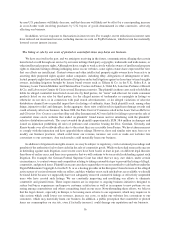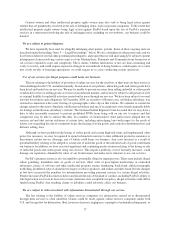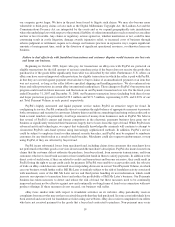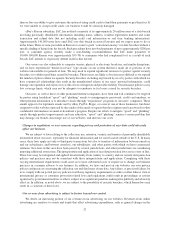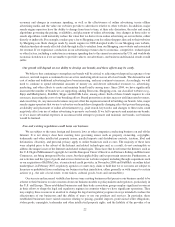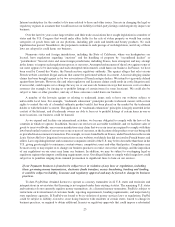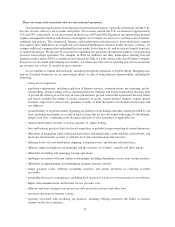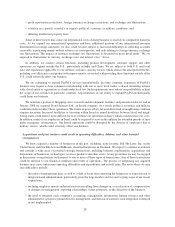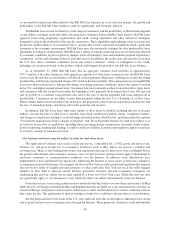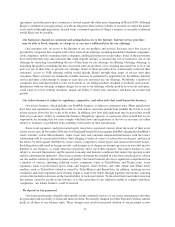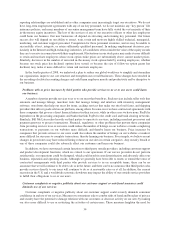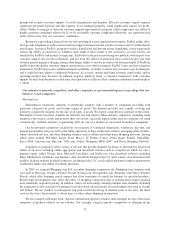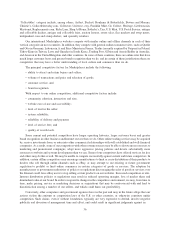eBay 2008 Annual Report Download - page 34
Download and view the complete annual report
Please find page 34 of the 2008 eBay annual report below. You can navigate through the pages in the report by either clicking on the pages listed below, or by using the keyword search tool below to find specific information within the annual report.including the ability to dispute and reverse charges directly with their credit card provider if merchandise is not
delivered or is not as described, the ability to earn frequent flier miles or other incentives offered by credit card
issuers, the ability to defer payment, or a reluctance to provide bank account information to PayPal. The proportion
of PayPal’s payment volume funded using credit cards has increased over time. In addition, some of PayPal’s newer
offerings, including the ability to make a limited number of payments without opening an account, have a higher
rate of credit card funding than PayPal’s basic product offering. In September 2006, PayPal entered into a settlement
agreement with the attorneys general of a number of states under which it agreed to pay $1.7 million to the attorneys
general, shorten and streamline its user agreement, and communicate more information regarding protection
programs to users. Also in September 2006, PayPal announced that it had reached a preliminary settlement
agreement under which it agreed to pay approximately $3.5 million into a settlement fund for the benefit of a class
represented by plaintiffs in a suit that alleged, among other things, that PayPal’s disclosure regarding the effects of
users’ choice of funding mechanism was deceptive. This settlement has now been approved by the court. Although
PayPal did not admit any liability for any of the allegations in the two cases, changes to our disclosure practices
could result in increased use of credit card funding, which could harm PayPal’s business.
PayPal’s failure to manage customer funds properly would harm its business.
PayPal’s ability to manage and account accurately for customer funds requires a high level of internal controls.
In some of the markets that PayPal serves and currencies that PayPal offers, PayPal has a limited operating history
and limited management experience in managing these internal controls. As PayPal’s business continues to grow, it
must strengthen its internal controls accordingly. PayPal’s success requires significant public confidence in its
ability to handle large and growing transaction volumes and amounts of customer funds. Any failure to maintain
necessary controls or to manage accurately customer funds could diminish customer use of PayPal’s product
severely.
System failures could harm our business.
We have experienced system failures from time to time, and any interruption in the availability of our websites
will reduce our current revenues and profits, could harm our future revenues and profits, and could subject us to
regulatory scrutiny. Our eBay.com website has been interrupted for periods of up to 22 hours, and our PayPal
website has suffered intermittent unavailability for periods as long as five days. In August 2007, Skype experienced
an interruption during which the majority of Skype’s users were unable to use its products for approximately two
days. Any unscheduled interruption in our services results in an immediate, and possibly substantial, loss of
revenues. Frequent or persistent interruptions in our services could cause current or potential users to believe that
our systems are unreliable, leading them to switch to our competitors or to avoid our sites, and could permanently
harm our reputation and brands. Reliability is particularly critical for PayPal, especially as it seeks to expand its
Merchant Services business. Because PayPal is a regulated financial entity, frequent or persistent site interruptions
could lead to fines, penalties, or mandatory changes to PayPal’s business practices, and ultimately could cause
PayPal to lose existing licenses it needs to operate or prevent it from obtaining additional licenses that it needs to
expand. Finally, because our customers may use our products for critical transactions, any system failures could
result in damage to our customers’ businesses. These customers could seek significant compensation from us for
their losses. Even if unsuccessful, this type of claim likely would be time consuming and costly for us to address.
Although our systems have been designed around industry-standard architectures to reduce downtime in the
event of outages or catastrophic occurrences, they remain vulnerable to damage or interruption from earthquakes,
floods, fires, power loss, telecommunication failures, terrorist attacks, computer viruses, computer denial-of-
service attacks, and similar events. Some of our systems, including our Shopping.com and Skype websites and the
systems related to the Bill Me Later business, are not fully redundant, and our disaster recovery planning is not
sufficient for all eventualities. Our systems are also subject to break-ins, sabotage, and intentional acts of vandalism.
Despite any precautions we may take, the occurrence of a natural disaster, a decision by any of our third-party
hosting providers to close a facility we use without adequate notice for financial or other reasons, or other
unanticipated problems at our hosting facilities could result in lengthy interruptions in our services. We do not carry
business interruption insurance sufficient to compensate us for losses that may result from interruptions in our
service as a result of system failures.
26


